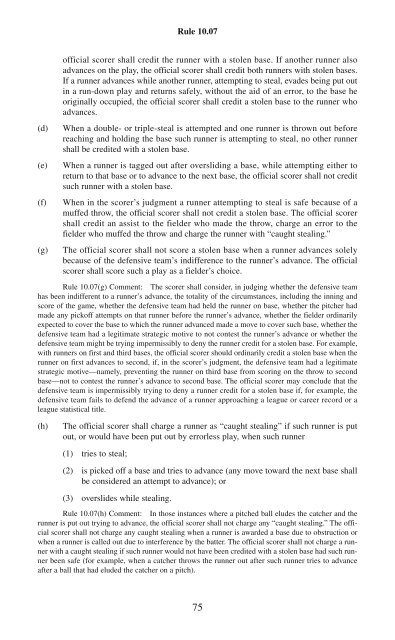OFFICIAL BASEBALL RULES
1SPD1Aq
1SPD1Aq
You also want an ePaper? Increase the reach of your titles
YUMPU automatically turns print PDFs into web optimized ePapers that Google loves.
Rule 10.07(d)(e)(f)(g)official scorer shall credit the runner with a stolen base. If another runner alsoadvances on the play, the official scorer shall credit both runners with stolen bases.If a runner advances while another runner, attempting to steal, evades being put outin a run-down play and returns safely, without the aid of an error, to the base heoriginally occupied, the official scorer shall credit a stolen base to the runner whoadvances.When a double- or triple-steal is attempted and one runner is thrown out beforereaching and holding the base such runner is attempting to steal, no other runnershall be credited with a stolen base.When a runner is tagged out after oversliding a base, while attempting either toreturn to that base or to advance to the next base, the official scorer shall not creditsuch runner with a stolen base.When in the scorer’s judgment a runner attempting to steal is safe because of amuffed throw, the official scorer shall not credit a stolen base. The official scorershall credit an assist to the fielder who made the throw, charge an error to thefielder who muffed the throw and charge the runner with “caught stealing.”The official scorer shall not score a stolen base when a runner advances solelybecause of the defensive team’s indifference to the runner’s advance. The officialscorer shall score such a play as a fielder’s choice.Rule 10.07(g) Comment: The scorer shall consider, in judging whether the defensive teamhas been indifferent to a runner’s advance, the totality of the circumstances, including the inning andscore of the game, whether the defensive team had held the runner on base, whether the pitcher hadmade any pickoff attempts on that runner before the runner’s advance, whether the fielder ordinarilyexpected to cover the base to which the runner advanced made a move to cover such base, whether thedefensive team had a legitimate strategic motive to not contest the runner’s advance or whether thedefensive team might be trying impermissibly to deny the runner credit for a stolen base. For example,with runners on first and third bases, the official scorer should ordinarily credit a stolen base when therunner on first advances to second, if, in the scorer’s judgment, the defensive team had a legitimatestrategic motive—namely, preventing the runner on third base from scoring on the throw to secondbase—not to contest the runner’s advance to second base. The official scorer may conclude that thedefensive team is impermissibly trying to deny a runner credit for a stolen base if, for example, thedefensive team fails to defend the advance of a runner approaching a league or career record or aleague statistical title.(h)The official scorer shall charge a runner as “caught stealing” if such runner is putout, or would have been put out by errorless play, when such runner(1) tries to steal;(2) is picked off a base and tries to advance (any move toward the next base shallbe considered an attempt to advance); or(3) overslides while stealing.Rule 10.07(h) Comment: In those instances where a pitched ball eludes the catcher and therunner is put out trying to advance, the official scorer shall not charge any “caught stealing.” The officialscorer shall not charge any caught stealing when a runner is awarded a base due to obstruction orwhen a runner is called out due to interference by the batter. The official scorer shall not charge a runnerwith a caught stealing if such runner would not have been credited with a stolen base had such runnerbeen safe (for example, when a catcher throws the runner out after such runner tries to advanceafter a ball that had eluded the catcher on a pitch).75


